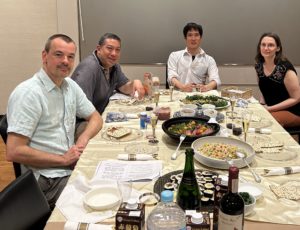“David went from there to Mitzpeh of Mo’av and said to the king of Mo’av, ‘Please let my father and mother come and stay with you until I know what God will do for me.'”-1 Samuel 22:3
After leaving the Cave of Adullam, David went to Moab with his elderly parents.
He first tried going west, but that didn’t work out, so he headed east to Mitzpah of Moab, which means “overlook” or “watchtower.“
This shows that David crossed the Jordan River to its other side, maybe crossing near Jericho, and went up to this stronghold city in Moab that overlooked the Jordan River Valley.
This area used to be ruled by Reuben and Gad, but Moab seemed to recapture it before Joshua and the Israelites came.
So the question that arises is why did David go to Moab, a long-time enemy of Israel?
There’s been a lot of debate on the issue but most folks think it’s because his great-grandmother Ruth was from Moab.
This explains why David thought his parents would be safer from Saul in Moab than anywhere else.
And it appears the King of Moab welcomed David and his family and gave them a safe place to stay.
Now, I want you to notice what David told the king of Moab.
“Please let my father and mother
come and stay with you until
I know what God will do for me.”
Here’s the thing.
This is one of the few instances when the word ELOHIM instead of YEHOVAH is being used for the word God.
You know what ELOHIM means, don’t you?
It’s the general term for “God”.
Depending on the context, it can mean “God” with a big “G” or “god” or “gods” with a little “g”.
So why in the world would David refer to his god using the generic title ELOHIM?
Well, here’s the thing.
The king of Moab had agreed to help David in a desperate situation by providing shelter for his parents.
And David was aware the Moabites didn’t worship the God of Israel.
They worshipped a pagan god called CHEMOSH.
So out of respect for the King from whom he was receiving hospitality, David chose to use the general term ELOHIM.
What takeaway can we extract from this?
Possibly it’s best to be diplomatic when dealing with unbelievers or those who have little understanding of the Hebrew or Messianic perspective of the Bible…
Instead of beating them over their head for their lack of understanding…
I’ve seen too many messianic believers who think they’re the bee’s knees because…
They know a couple of Hebrew words…
They’re married to someone who is ethnically Jewish…
Or they have some Jewish blood in them…
As a result, they assume a condescending attitude toward sincere gentile seekers and make them feel inferior or like idiots because of their so-called lack of a Hebraic understanding of the Scriptures.
I must confess I am guilty of this and repent.
The truth is without the Christian Church I would never have been exposed to the Bible in the first place.
I attended a Passover Seder yesterday hosted by Joe.
He is an Orthodox Jewish believer in Messiah and a good friend of mine (see the photo above).
A couple of Christian couples also attended, and I must say I was very impressed with how kind and patient he was in explaining the true meaning of Passover to gentile believers in Messiah who had little idea what this Biblical feast is about.




I have found myself very frustrated with those who do not know Hebrew trying to use Hebrew words, and their transliteration is atrocious!
It is obvious to anyone who knows Hebrew, even the little bit I do, that they just don’t know what they are doing, and they insult the language.
I call these people “Jew-wanna-be’s”: they should be careful what they ask for.
Donna and I have hosted Gentile friends (and occasionally non-believing Jewish friends) at our Seder every year now for over 25 years, and they always enjoy it. It is a blessing to show how much of the Messiah is in the Seder, and how much of Judaism is in Christianity (despite the attempts to be rid of it).
I’d love to attend your Seder…if God willing I’m ever in your area during the Passover season…
I’ve been blessed to be at your Sedar. The love of God and Jesus is there. The joining of our common beliefs makes the Passover so special.
Being in South Carolina now, I will miss the opportunity of breaking matzoh with you & Donna.